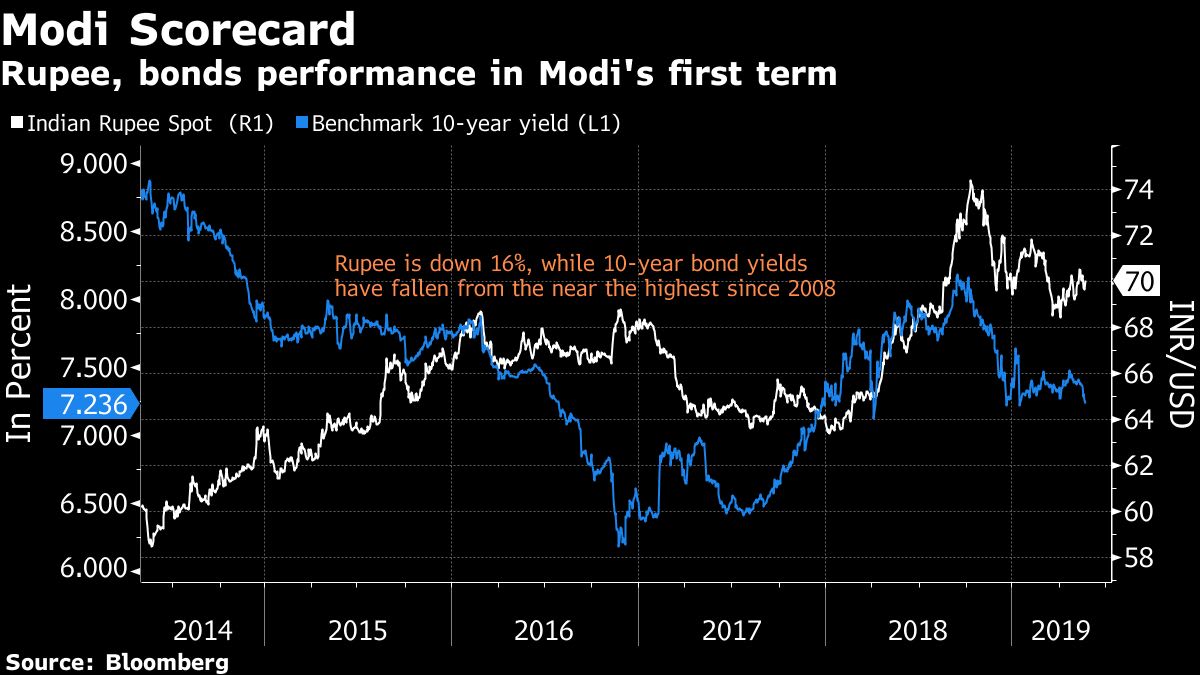
(Bloomberg) -- A decisive mandate for India’s ruling coalition and a second term for Prime Minister Narendra Modi has assured investors of stability and policy continuity in Asia’s third-biggest economy.
Still, equity markets ended in the red after surging to an intraday record on Thursday as the result broadly matched investor expectations and was partly priced in after exit polls this week.
Political stability alone isn’t likely to drive continued outperformance by India’s equities or currency, with investors also weighing headwinds from softer domestic consumption, rising oil prices and a trade war. And valuations are already on the higher side: The benchmark S&P BSE Sensex trades at a 12-month blended forward price-to-earnings multiple of 18.3, above its five-year average.
“Markets are pricing in double-digit earnings growth over next few years. From a risk reward point of view, it is delicately balanced,” Nilesh Shah, chief executive at Kotak Asset Management Co., said in an email. “The direction will depend on steps that the government takes to accelerate growth.”
Here’s a snapshot of the winners and losers from India’s elections:
WINNERS
Agricultural Sector
In an interim budget in January, the government made clear that farmers are at the top of its agenda. The party aims to invest 25 trillion rupees ($359 billion) in rural development and offer farmers 6,000 rupees per year in income support. Also, it has planned increased spending on animal husbandry and fisheries.
Rural-focused companies including those providing seeds, pesticides, irrigation products, consumer staples and motorbike manufacturers stand to gain.
Watch Kaveri Seed, Prabhat Dairy and Avanti Feeds.
Infrastructure and Real Estate
During the campaign, Modi pledged to spend $1.44 trillion on repairing the country’s creaky infrastructure. Meanwhile, the government is already promoting affordable housing and has announced tax breaks to encourage buyers.
Winners include cement companies, pipes, tiles and sanitary-ware manufacturers, capital goods and infrastructure companies.
Larsen & Toubro, Sadbhav Engineering, Dilip Buildcon, Thermax, Bharat Heavy Electricals and Siemens Ltd. are some names that have already gained. In real estate, DLF Ltd., Godrej Properties and Sobha Ltd. have advanced.
“We can expect the government to continue pouring money into affordable housing and transport infrastructure,” said Kristy Fong, Asian equities investment director at Aberdeen Standard Investments, said in an email. “It could spark a renewed capital expenditure cycle.”
Financials
The financial sector could use a lot of help: A $190 billion mountain of stressed loans needs cleaning up and the cash woes at non-bank finance companies have hit loans for new homes, vehicles and consumer durables. Capitalization and consolidation in state-run banks is a key theme to watch.
State Bank of India, Punjab National Bank, Bank of Baroda, ICICI Bank, HDFC Bank, Axis Bank, Kotak Mahindra Bank are likely to benefit if the government tries to shore up the financial system.
“From a long term perspective, of about 3-5 years, the banking space exhibits signs of growth potential,” said Karthikraj Lakshmanan, a senior equities fund manager at BNP Paribas Asset Management India Pvt.
Consumption
For the top consumer companies that have been flagging a slowdown in demand, the mandate will offer some relief given the government’s plans to boost farm income at a time when the central bank is easing monetary policy. Staples, consumer durables and motorbike manufacturers stand to gain.
Watch companies like Hero Motocorp, Bajaj Auto, Exide Industries and Maruti Suzuki in the auto segment, along with consumer plays Hindustan Unilever, Nestle India and ITC Ltd.
LOSERS
Rupee
Optimism about a Modi victory buoyed the Indian rupee over the past three months, helping it to the best performance among major Asian peers. With elections out of the way foreign exchange investors are likely to refocus on rising oil prices, which will hurt India’s already wide current-account deficit, record government borrowings and headwinds from a U.S.-China trade war.
Loan Defaulters
The government has led a crackdown on bad debt as it seeks to restore the health of the nation’s state-run banks. That drive -- supported by India’s two-year-old bankruptcy law -- is likely to continue after having already snared businesses including Anil Ambani’s Reliance Communications and Essar Group’s Essar Steel India Ltd.
--With assistance from Candice Zachariahs and Ameya Karve.
To contact the reporter on this story: Nupur Acharya in Mumbai at nacharya7@bloomberg.net
To contact the editors responsible for this story: Divya Balji at dbalji1@bloomberg.net, Joanna Ossinger
For more articles like this, please visit us at bloomberg.com
©2019 Bloomberg L.P.